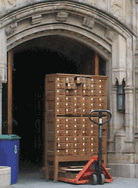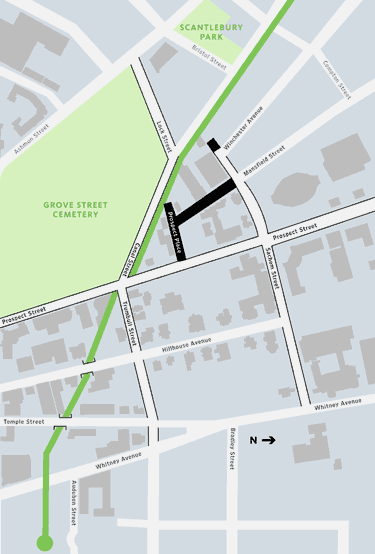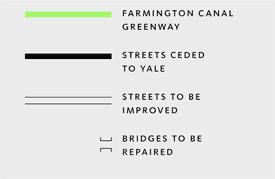
 |
||
The Yale Alumni Magazine is owned and operated by Yale Alumni Publications, Inc., a nonprofit corporation independent of Yale University. The content of the magazine and its website is the responsibility of the editors and does not necessarily reflect the views of Yale or its officers. |
|
To Catch a Thief A year after being arrested with five antique maps from the Beinecke Library in his briefcase, a once-eminent map dealer appeared in court in New Haven on June 22 to answer charges of theft. Edward Forbes Smiley III, 50, of Martha’s Vineyard, pleaded guilty in federal court to one count of theft of a major artwork and in state court to three counts of larceny. But as part of his plea agreement, he also admitted to having stolen 97 maps worth more than $3 million from eight library collections over seven and a half years. Eleven of the maps were from Yale’s Sterling Memorial Library, and nine came from the Beinecke. Smiley’s long run of thievery ended on June 8, 2005, after a Beinecke employee found an X-Acto blade on the floor of the library (see Light & Verity, September/October 2005). She alerted security personnel, who caught Smiley on tape removing a map valued at $150,000 from a book. New Haven police arrested him shortly after he left the library and charged him with larceny. Federal prosecutors and the FBI then launched a wider investigation to determine whether he had stolen maps from other institutions. Smiley’s attorney, Richard Reeve, acknowledged that the X-Acto knife blade belonged to Smiley—though he said it wasn’t used to remove any Beinecke maps. The other incriminating piece of evidence was the fact that worm holes in a map found in Smiley’s possession lined up exactly with worm holes in a book Smiley had been using at the Beinecke—a book that was missing its map. Smiley had originally claimed that the five maps were his own, but in court, his lawyer yielded to the evidence. “These are pretty distinctive worm holes, I agree,” said Reeve. Smiley said in federal court that he had “knowingly and willfully” removed five maps from the Beinecke. He said he regretted his actions and apologized “to the court and to all the individuals and institutions” that were affected. After his appearance in federal court, Smiley was hurried out the door to face larceny charges in state Superior Court. Trailed by a phalanx of reporters and photographers shouting questions at him, he made the two-block walk in silence as Reeve said repeatedly, “He has no comment.” Federal sentencing was scheduled for September 21, with state sentencing to be held the following day. Smiley’s cooperation with investigators in helping locate the stolen maps was noted by both judges. As a first-time offender, he faces about five years in prison, but could receive less because of his cooperation. However, librarians at some of the institutions Smiley visited over the years aren’t sure he has accounted for all of his thefts. Clive Field, director of scholarship and collections at the British Library, recently wrote to the FBI that he has “serious doubts about the completeness of the investigation and the extent of Mr. Smiley’s cooperation.” Field noted that although Smiley admitted to taking one map from the British Library, they suspect he took three more. Yale said in an official statement that it has confidence in the thoroughness of the investigation. Yale has taken several measures with regard to its collections since the theft occurred. Last November, Sterling Library map curator Fred Musto left his position; the Hartford Courant reported that he was fired. An inventory following Smiley’s arrest uncovered about 80 maps missing from Sterling, but library officials say they don’t believe Smiley took them. A detailed list of the missing maps has been posted on the library’s website to help recover the lost materials. Yale has also enhanced library security, both in the rooms where maps are kept and in the procedures visitors must follow before gaining access to the collections. Ex-Taliban Spokesman Rejected for Degree Program A former spokesman for the Taliban will likely continue taking courses in Yale College this year—but not toward a Yale degree. Sayed Rahmatullah Hashemi, whose presence on campus set off a heated controversy earlier this year, was rejected this summer by the university’s Eli Whitney Program, which admits a small number of older students every year to pursue bachelor’s degrees. “I was saddened by Yale’s decision, but I am not disappointed,” Hashemi told the Yale Alumni Magazine in an e-mail from Pakistan. The admissions office applied a tougher standard to this year’s Eli Whitney applicants than it has in the past. In previous years, up to 30 percent had been invited to attend. This year only 2 of 29 made the cut. “The program had come under scrutiny this past spring,” university officials said in a prepared statement, “and Yale president Richard C. Levin had directed that, pending a full review, the standard for admission to this program should be as rigorous and demanding as that used in the admission of full-time regular Yale College students.” The news that Hashemi was studying at Yale sparked protest from media pundits and alumni. Clint Taylor '96, who led an online campaign against Hashemi’s presence at Yale, says he is dissatisfied that the university didn’t publicly repudiate the Afghani student on the basis of his involvement with the Taliban. “I expect there are some very bitter applicants [to the Eli Whitney Program] out there who would have gotten in and made decent Yalies, except that Yale chose this route to cover their decision on Hashemi,” he says. Last year, Hashemi took courses and earned college credit in Yale’s non-degree “special student” program. Once admitted, non-degree special students may continue taking courses without reapplying and may earn up to 18 course credits at Yale. In his e-mail, he said, “I am sure that I would like to come back to Yale for one more year.” Bob Schuster '67, a lawyer in Jackson, Wyoming, and one of Hashemi’s financial supporters, reiterates his confidence in the university’s mission. “Yale is generally highly competitive and should be. The fact that Rahmatullah didn’t move from special student status to degree-program status in the face of that kind of competition is not a disappointment.” Expressing hope that Hashemi’s classes in the coming year will prepare him to reapply to the Eli Whitney Program, Schuster says he remains committed to Hashemi’s educational goals. “He is a young man who is moderate, articulate, and bright, and he can be a bridge between our cultures and countries.” Yale Under Secrutiny It’s been an uncomfortable summer for Yale, and not just because of the sizzling temperatures. In June, the university learned that it was being investigated by three federal entities—the Department of Health and Human Services, the Department of Defense, and the National Science Foundation. Yale has been served subpoenas for documents on 47 grants awarded over 10 years and worth $45 million (about 2 percent of the $2 billion in federal grants that Yale received in that time). The documents relate to Yale’s management of those grants and its related bookkeeping. (For an interview with Yale president Richard Levin about the subpoenas, see “Yale Under Investigation.”) Subpoenas of this scope are rare for universities, but this is not the first time Yale’s accounting practices have come under scrutiny. In 1996, the government undertook extensive audits of Yale and other universities, looking for possible Medicare fraud; several institutions were penalized, but Yale was not charged. In 1998, the medical school agreed to pay a total of $5.6 million to the federal government and state and private insurance companies to end an investigation into alleged overbilling. Yale says it doesn’t know what prompted the current subpoenas. Major grant management investigations may stem from whistleblower lawsuits, says Tony DeCrappeo, president of the Council on Governmental Relations, an association of research universities. In these qui tam suits, a whistleblower sues an institution on behalf of the government. Northwestern, Johns Hopkins, and Cornell have all settled qui tam suits in recent years; Cornell’s 2005 settlement cost it $4.4 million. Though Yale knows of no whistleblower in its midst, the targets of qui tam investigations are often the last to know. “If this is a whistleblower case, the investigation could have started three or four years ago,” DeCrappeo says. Another possibility may be that the subpoenas stem from an audit that the Department of Health and Human Services conducted at Yale last fall. Such audits are fairly routine, but the university didn’t acquit itself well. DHHS accused Yale of slipshod accounting on a $1.7 million grant for research on gene expression in stem cells. The report charged Yale with claiming $193,779 in costs that didn’t comply with the rules of the grant by, for example, charging for supplies originally purchased for other research, without justifying the transfers. It also faulted the principal scientist for spending less than the required amount of his time on the research. Yale disputed this and other charges and pointed to several research papers as evidence that it had fulfilled the grant’s purpose. (DHHS did not name the principal scientist, but Bernard Forget of the medical school was the only author to be listed on all four papers. He did not return phone calls.) But Yale lacked the required documentation that its costs and time allocations were appropriate. Of most concern, however, was Yale’s own finding that part of a grant document it provided to auditors had been deleted: according to DHHS, an e-mail requesting cost transfers had originally said the transfers were needed to spend down the grant. “The university considered the alteration a serious matter and conducted an investigation,” the audit report noted. In the same month that federal investigators completed their fieldwork in New Haven, Forget stepped down as chief of the hematology section at the medical school, but the university will not comment on whether this move was related to the audit. Also in the wake of the fall audit, Yale hired Huron Consulting Group to improve its grant management and created and filled the position of associate vice president for research administration to oversee compliance with all federal grant rules, including accounting, safety, and lab animal care. (During this restructuring, the associate vice president for finance, who had previously overseen grants accounting, among other areas, announced she will retire in October after completing 30 years of service.) And the failed audit was likely on Levin’s mind when he sent a letter to faculty and staff in June about the federal subpoenas, urging “everyone in the strongest possible terms to provide complete and truthful replies to questions about these matters.” Thais Protest Royal Biography It was not your ordinary book club meeting. This spring, the cabinet secretary of the government of Thailand traveled to Woodbridge Hall just to talk to Yale president Rick Levin and vice president Linda Koch Lorimer about a book. He brought with him Weera Manakongtreecheep '82MPPM, '83MA, president of the Thai Yale Club. At some point, he even paid a call to George H. W. Bush '48. The book in question was Paul Handley’s The King Never Smiles, a Yale University Press biography, released this summer, of Thailand’s King Bhumibol Adulyadej. For Yale, the controversy was just another reminder of the complexity involved in becoming a more global institution. The life of the world’s longest-serving monarch is shrouded in official secrecy. Although there have been a few approved biographies of the king, “almost everything is uncritical and hagiographical,” says Kevin Hewison, a scholar of Thailand at the University of North Carolina. In putting together his manuscript, Handley—who lived for 13 years in Thailand and wrote for the Far Eastern Economic Review—relied on many anonymous sources, and for good reason: Thailand has severe lese majeste laws that include prison sentences of 15 years. King Bhumibol has overwhelming support among his 64 million subjects. In June, on the 60th anniversary of his rule, hundreds of thousands gathered in the Royal Plaza to celebrate a king they see as a moral force who helps the poor and stabilizes their democracy. Handley acknowledges this popularity, but he also depicts the king as ambitious and political, despite his official status as a figurehead. The Thai government banned the book before publication—to prevent Thais from “[taking] to the street and targeting the American embassy,” according to Sumet Jumsai, a Cambridge-educated former newspaper columnist. The government also blocked access to the Yale Press website in January, press officials say. Sumet called for a U.S. court injunction to stop publication and demanded that Thai Yalies pressure the university—“failing which the question of loyalty should be seriously considered.” Fearing a media storm, Thai elites squelched Sumet’s campaign and opted instead for precisely the type of approach Handley’s book suggests the palace prefers: quietly dispatching the cabinet secretary. The publication Thai Day reported that the delegation also met with former president Bush, but Yale will not comment on whether Bush got involved. “I don’t speak about former presidents or current presidents or what they do or don’t do,” Lorimer says. Lorimer says Yale explained its “commitment to freedom of expression” at the meeting but let the Thais review the book for accuracy. A week later, the embassy responded, expressing extreme disappointment in the author’s viewpoint and raising several factual errors that the press corrected in final proofs. (The embassy declined comment for this story.) In the end, publication was delayed until after the king’s jubilee celebration. Although some cried foul, the press denies caving in. “We wanted to be sensitive to the concern that we were exploiting the king’s jubilee to get sales. We didn’t want to demean the book by making it appear that we were staging it as a publicity stunt,” says director John Donatich. SOM Rewrites the Course List “The hardest thing to change at a business school is the curriculum, “ says Joel Podolny, dean of the Yale School of Management. Indeed so. In 1990, when Michael Levine, then dean of SOM, attempted to revamp the school’s program, disgruntled alumni hired a plane to fly over commencement trailing a banner that likened him to a corporate criminal. Now Podolny is the one who’s doing the revamping, and he’s hoping for a much more positive reaction. With a wave of criticism washing over the business school community, SOM is one of the few schools to react with comprehensive changes. Perhaps that’s because the dean himself is a critic of the current system. “The way we teach management education is disconnected from what the leaders of organizations, regardless of sector, are looking for from their managers,” Podolny said earlier this year. Such thinking has led to a renovation of SOM’s approach. SOM’s new program, which is being launched this semester, forgoes the functional lines that form the basis of nearly every other business school curriculum. First-year students will no longer take courses focusing solely on marketing, finance, or accounting. Instead, they will take two groups of short courses that compel them to look at managerial questions from the perspectives of actors both inside and outside an organization. A class called “Customer,” for example, will analyze managerial decisions from the consumer’s perspective. A similar idea drives classes like “Investor,” “Employee,” and “Competitor.” The hope, says Podolny, is to create managers who can work across the functional boundaries that partition many organizations. “Students will still need their accounting textbook,” says Podolny, “but they’ll carry it across the different perspectives.” The changes give rise to some tough questions. For instance: can students really learn accounting without taking a course devoted to the subject? The answer should come at the end of the academic year, when the school plans to test students' basic business knowledge and compare it with that of previous classes. The much bigger question, though, concerns SOM’s place in the business school community. With its humanistic mission of training leaders for public, private, and nonprofit management, SOM occupies a particular niche in the world of business education. This has, in part, kept it from being ranked as high as the business schools of Yale’s peer institutions. But when Levine tried to turn the school into a more mainstream MBA factory in the early nineties, the alumni revolted. Is the new curriculum part of a similar effort to sacrifice the school’s soul for a higher spot in the rankings? No, says Podolny, he’s in fact trying to bring the curriculum in line with the school’s culture. Just as SOM tries to break down barriers between the private and public sectors, he says, the new curriculum will work to break down functional barriers. “This curriculum creates the possibility for SOM to be in that pantheon of schools that are role models,” he says. “If we do that effectively, the rankings will take care of themselves.” Street Value
Yale got a boost in its effort to develop the area north of the Grove Street Cemetery this summer, when the City of New Haven agreed to abandon portions of three streets in the area and cede them to the university (see map, above). In exchange, Yale will contribute $10.25 million toward the improvement of the area’s streets and sidewalks, the repair of two bridges over the Farmington Canal Greenway, the expansion of nearby Scantlebury Park, and completion of the Greenway between the Yale campus and the arts district on Audubon Street. The street closings will allow the university more flexibility in its plans for the area, which are rumored to include one or more new residential colleges. |

Top drawers Technology chased a few pieces of Yale history out the front door of Sterling Memorial Library this year. In two phases in March and July, the library removed and sold the 80 freestanding cabinets that once housed the card catalog in the nave. Yale students, faculty, and employees were offered a chance to buy the cabinets for $50 each on a first-come, first-served basis. (They went fast.) The built-in cabinets in the nave are staying where they are, at least for now. The cards themselves will be stored in the basement of Sterling and will be accessible to researchers. |

The growth of Yale football In his day, Jim DeAngelis '35S (5'9", 165 pounds) was big enough to play center and linebacker for Yale. But times and jersey sizes have changed. Above, DeAngelis and current offensive lineman Steve Basserman '07 (left) demonstrate that while Yale’s gridiron dominance may have shrunk in 70 years, its players have not. (The photo was taken during spring practice in April.) As William Wallace '45W tells it in Yale’s Ironmen, in a 1934 upset of Princeton, DeAngelis and ten teammates played all 60 minutes—without substitutions. That’s something no college football team, of any size, has done since. |
Campus Clips A Yale Divinity student was shot in the abdomen while scuffling with a masked robber who tried to hold up the student and three friends on Mansfield Street on July 28. The victim was expected to recover fully. The group restrained the assailant until police came, and he was charged with assault, robbery, and carrying a pistol without a permit. When fighting broke out in Lebanon this summer, Yale used a private security firm to evacuate four students who were in Beirut. The university located the students through a new database, maintained by the Office of the Secretary, where students can file their plans for international travel. Using a bootleg screenplay and student actors, art student Chris Moukarbel '06MFA shot his own 12-minute segment of the film World Trade Center (by director Oliver Stone '68) in order to make a point about “Hollywood’s authority to write history.” When he posted the project online, prior to the release of Stone’s film, the plot became predictable: Paramount Pictures sued for copyright infringement. Paramount dropped the suit in August after Moukarbel agreed to destroy most copies of the film, which was his Yale master’s thesis. The courtroom sketches from the 1971 murder trial of Black Panther Bobby Seale have been acquired by the Beinecke Library. The 20 sketches by Robert Templeton, commissioned by CBS News, are the only visual documentation of the trial that rocked New Haven and Yale. Divinity School dean Harry Attridge needed the wisdom of Solomon to deal with a long-running dispute over a dog run on the school’s property. Some neighbors on St. Ronan Street disliked the noise and wanted the run shut down, but Attridge worked out a solution with a list of posted rules that rivals Leviticus in length and thoroughness. The first commandment? “This is a low-bark dog run.” |
|
|
|
|
|
|
|
|
©1992–2012, Yale Alumni Publications, Inc. All rights reserved. Yale Alumni Magazine, P.O. Box 1905, New Haven, CT 06509-1905, USA. yam@yale.edu |
||

